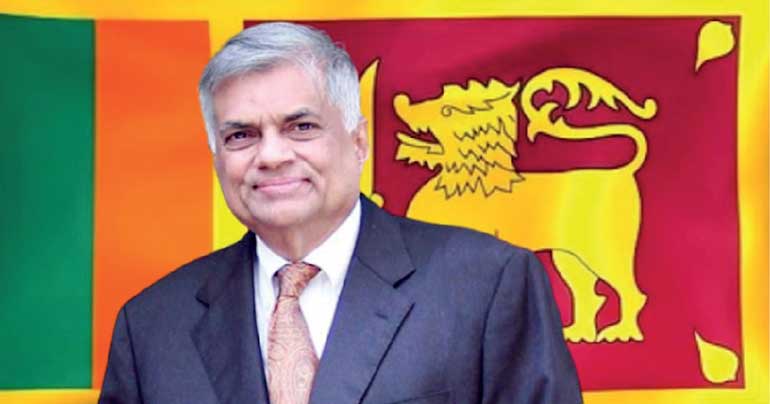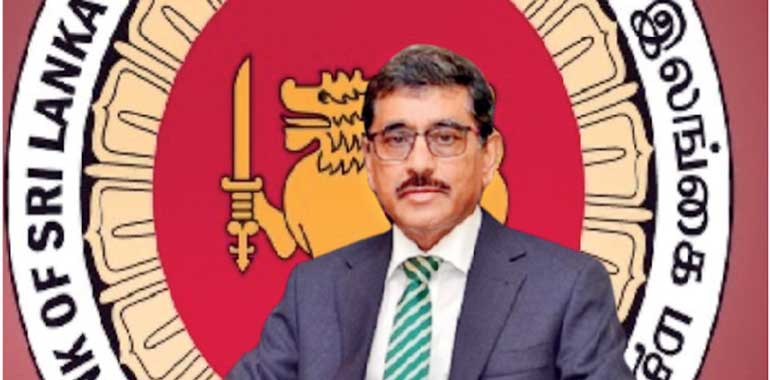Monday Feb 16, 2026
Monday Feb 16, 2026
Wednesday, 25 May 2022 00:24 - - {{hitsCtrl.values.hits}}

Prime Minister Ranil Wickremesinghe

Central Bank of Sri Lanka Governor Dr. Nandalal Weerasinghe
 Due to gross mismanagement of the entire Sri Lankan economy, the new incumbent Prime Minister Ranil Wickremesinghe had an apocalyptic warning that things were going to be really bad.
Due to gross mismanagement of the entire Sri Lankan economy, the new incumbent Prime Minister Ranil Wickremesinghe had an apocalyptic warning that things were going to be really bad.
The current level of mistrust of parliamentarians by the general public and economic stakeholders in public institutions has eroded to a dangerous level given the current circumstances. As a consequence of this experience, confidence is very low in Sri Lanka, leaving it vulnerable to substantial price increases in the essentials, especially food, fuel, medical supplies and over-reactions when there is any hint of possible loss of currency value. Unfortunately, hysteria is a self-feeding creature; the more consumers or citizens panic, the more they hoard commodities, and the more they hoard, the more panic and speculation they create. So, essentially, this phenomenon often results in a vicious cycle. Chaos begets more chaos!
A look at what is happening around the world, makes it clear that this problem is not a Sri Lankan idiosyncrasy as many other countries are also facing a currency crisis and intentional debt default with other countries and financial institutions. Especially the frontier and emerging markets; the World Bank named 70 countries low and middle-income countries facing debt repayments. The report said this burden could signal a major recession in economies in 2022/23.The main difference with Sri Lanka’s case is that their nation’s currency crisis is largely self-inflicted gross mismanagement.
Often, when fear triumphs over expectation and hope, rational thinking becomes the ultimate victim. Most often, reassurances from the Government leaders are dismissed because on a lot of occasions, they do not stand the test of time and they certainly do not have the gravitas. It is presently difficult for someone to reconcile why it is problematic for the generality of the population to not have the basic essentials as everything needs to be imported rather than homegrown. The lack of foreign currency to import, obviously creates disaffection for the banks, Central Bank of Sri Lanka and the Government. What is desperately needed is a rare interregnum of sound stewardship and economic recovery through the Government before things regress to the nadir. The economic meltdown that we are embarking upon right now is going to be a traumatic experience that can only be erased by the passing of time. For the generations which lived through such a horrible chapter of time.
Ridiculed domestic migrant workers in the Middle East from Sri Lanka and garment workers are playing their part in earning foreign currency for the country. At this junction, it might be worthwhile to point out the obvious; the three sectors are predominantly dominated by female workers. Suffice to say, these are the people doing much of the work for the nation. Especially when there are few sectors and companies earning foreign currency that are used in the local market. Added to this, the importation of unnecessary sundry items, metaphorically speaking such as toothpicks, exerts pressure on local currency. Do not get me wrong, I am not advocating for the recycling of toothpicks!
The gap between the exports and imports has been widening and also Government borrowing has not been realistic which has led to the current negative climate. Evidence and data to support this fact are there in the public domain. So, what else is bad in the Sri Lankan economy? Is it a crisis of expectations? The ordinary person is expecting a quick turnaround whilst Government leaders are saying that the turnaround will be long-term? In an economy that has been under strain for decades, do the country’s stakeholders have the patience and belief to support that turnaround?
For so many years, the economy has largely been driven by speculation and skulduggery from so many uncertainties in the country. Going further into the future, is this sustainable? Surely, with all the years of operating and surviving in a speculative mode, can the country’s stakeholders change that new-found culture? What seemingly started off as a risk management or hedging strategy because of lack of trust or faith in the trajectory of the economy became a defined way to actually make some profits through various arbitrage opportunities.
As they say, who can begrudge such profiteers, when they are just trying to survive? Presented with opportunities to make easy money, how many people would opt for the hard and long road? At the end of the day, the nation produces the phenomenon of cronyism, “tenderpreneurs” who use their political connections to secure government contracts for personal advantage and opportunists who do not produce or create any value, but people who just make calls and position themselves for some undeserved windfalls.
So what are the possible remedies for the national stakeholders’ mistrust in the Government’s management of the economy? With this background, all hope should not be lost as something can be salvaged. It is my carefully considered view that the Central Bank needs to acknowledge that a speculative nature is now prevalent and subconsciously embedded in the minds of the economy’s stakeholders. Likewise, every other person or institution with vested interests in this country needs to take that mistrust and speculative angle into mind when crafting operational and future plans.
One of the key issues affecting the Central Bank of Sri Lanka’s policies has been its failure to gauge and match its policies or plans with psychology or sentiment of the economy’s stakeholders, especially Sri Lankan citizens. Having mentioned this point, collective thinking comprising Government and corporate Sri Lanka needs to learn from this experience in order for them to tailor; befitting business strategies.
Moving the country forward there has to be a demarcation where the incumbent government does not manipulate the Central Bank for its own political expediency.
Initiatives like market surveys and research are important here, both done by the concerned entity and those done by impartial independent third parties.
The world over, central banks are well-informed on the psychological factors and market sentiment driving economic directions on the market. Central banking is additionally about agenda setting, psychological influencing together with the regulatory role. The central bank, with many disappointments, still clings on to hard regulation without the use of the soft touch through various agenda setting and engagement strategies through media initiatives or psychological conditioning.
Do not underestimate the media, the words from Napoleon Bonaparte still haunt us all up to this day, “The pen is mightier than the sword”. Hard regulation is “Stone Age” stuff in the era of social media and a heavily financially sophisticated world. Classical finance has its space and use, so does Neuroeconomics or Neurofinance which is also related to Behavioural Finance. Outright “Command Central Banking” will not work, which is outdated a bit like the Neanderthal man extinct!
Their Central Bank is bad in psychological reference and contextualisation. Further to the aforementioned points, the Central Bank of Sri Lanka should endeavour to wire itself into the sentiment and psychology of the market. More effectively, the psychological connection should be reciprocal. Economic participants must have a decent degree of understanding, faith and clarity and certainty in the Central Bank of Sri Lanka’s policies.
When that psychological connection is solid, economic participants can respond favourably to monetary policy. The idea of “Command Economics” or “Experimental or Trial Economics” by using citizens and economic agents as guinea pigs in an “economic lab” is a bad modus operandi. Clear economic agenda which can be accepted by most stakeholders of the economy should be set. The Central Bank and the economy’s stakeholders should complement each other with coherence. Clarity and mutual understanding can be achieved through consultative engagements with economic participants. Of paramount importance are the intended outcomes by the Central Bank of Sri Lanka together with the short, medium and long-term effects on various stakeholders.
Mario Draghi, former President of the European Central Bank, once remarked to a conference attended by governors of Central Banks that, “A transparent central bank is not only more accountable, but also more effective in implementing its monetary policy. If the general public and financial markets can understand how their central bank is likely to respond in a given situation, its so-called ‘reaction function’, they can form reasonable expectations about the future monetary policy and align themselves accordingly for monetary stability.”
There are many monetary policy statements which were announced to the market many times, yet the economy or market is far from being aligned accordingly. There is virtually no monetary and psychological harmony! With the nation’s past experience, it would be easier for the Central Bank of Sri Lanka to be in line with the market’s psychology than for the same market to operate or move in sync with the Central Bank of Sri Lanka’s psychology. Economic participants in the market need to be subtly cajoled towards a certain direction for a policy to be successful, not be pushed around!
On various occasions, speculative and arbitrage maximisation tendencies in the economy have been prevalent because of a deficiency in economic agenda setting through psychological tactics. It is high time the Central Bank considers the “soft-side” of economic management.
Sri Lanka can’t expect any assistance from its colonial masters as depicted on 16 May 2022, in the House of Lords in the UK. Where there were deliberations on Sri Lanka and a number of Lords, like Lord Moylan, Lord Naseby, Viscount Waverley and Lord Purvis of Tweed spoke for some form of emergency relief assistance to be provided but unfortunately, Her Majesty’s Government Representative, the Minister of State, Foreign, Commonwealth and Development Office, Lord Ahmad of Wimbledon failed to provide any assistance or any reassurance apart from telling the obvious, that they are collective contributors to the World Bank and that the $ 600 million includes assistance to provide economic and health support, including vital medicines and medical equipment. It looks like there won’t be any substantial assistance from the Western Hemisphere apart from platitude.